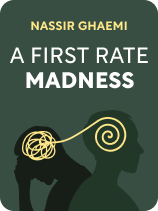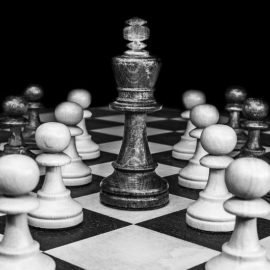

This article is an excerpt from the Shortform book guide to "A First Rate Madness" by Nassir Ghaemi. Shortform has the world's best summaries and analyses of books you should be reading.
Like this article? Sign up for a free trial here.
How do depression and empathy go hand-in-hand? How do depressed leaders use empathy to solve crucial problems?
According to A First-Rate Madness by Nassir Ghaemi, depression broadens a leader’s perspective and understanding by making them more empathetic. This is a trait that allows leaders to effectively navigate critical situations.
Read more about depression’s influence on a leader’s emotional level, and how they can gain empathy out of mental illness.
Depression Enhances Your Empathetic Understanding
In addition to enhancing realistic judgment, Ghaemi contends that depression broadens a leader’s perspective and understanding by making them more empathetic, a trait that allows them to effectively navigate critical situations.
The connection between depression and empathy is more than just relating to someone else—when you empathize, you truly experience what someone else is experiencing. Ghaemi explains that your brain has mirror neurons that activate when you see someone doing or feeling something. These allow you to feel as though you actually think someone else’s thoughts or feel their emotions, movements, and sensations.
(Shortform note: In Emotional Intelligence, Daniel Goleman writes that the amount of empathy you have depends on how you were nurtured during your childhood. Around age two and a half, toddlers begin to recognize pain experienced by others and not just their own. Parents who explain their feelings help their children become more aware of emotions in themselves and others, thereby increasing empathy. At the same time, while having a lot of mirror neurons helps you empathize with others, they can also make you unhappy if you’re overly sensitive to other people’s negative emotions.)
Ghaemi points to studies that link depression to higher empathy, particularly on an emotional level. He explains that depressive episodes leave you with a lingering sensitivity to other people’s experiences and allow you to better relate to them. This empathy ultimately allows you to understand multiple viewpoints, which is a key leadership trait.
(Shortform note: While depression can lead to increased feelings of empathy, it can also lead people to misunderstand some of those empathetic feelings. This can cause people with depression to experience empathetic distress, or feelings of guilt for other people’s negative feelings. They explain that people with depression are often sensitive to other people’s emotions yet have an inaccurate understanding of what causes their emotions. For example, a person with depression might notice irritability in their colleague’s tone while collaborating on a difficult project and think they’re annoyed with them instead of the project. This misunderstanding of causality can lead people with depression to experience more personal guilt and distress.)
Example: Mahatma Gandhi, Martin Luther King, and Nonviolent Activism
According to Ghaemi, depression heightened the empathy of Mahatma Gandhi and Martin Luther King Jr., helping them pioneer and advance nonviolent activism. Although sometimes dismissed as naive optimism, this form of resistance didn’t equate to passive acceptance, but instead centered on being firm and uncooperative without resorting to violence.
(Shortform note: One study found that nonviolent movements tend to be more successful than violent movements. After examining 323 movements against authoritarian governments, researchers determined that nonviolent movements—even those that failed—made a country four times more likely to transition to democracy. Successful nonviolent resistance movements benefited from mass participation and flexible strategies while those that failed lacked organization.)
Ghaemi argues that Gandhi’s depression is evident from some events in his early life—he had attempted suicide as a teenager and experienced depressive episodes throughout his life. Ghaemi argues that Gandhi’s struggles with this illness gave him the necessary empathy to cultivate his nonviolent approach to campaigning for India’s independence from British rule, encouraging his followers to understand their enemy’s perspective.
(Shortform note: Although Susan Cain doesn’t address Gandhi’s depression, in Quiet, she identifies similar traits of Gandhi’s personality as crucial to his success: his shyness and restraint in the face of conflict. She argues that he demonstrated soft power—the ability to win people over through gentle persistence and compelling beliefs rather than violence or threats. Rather than fight back, he steadily worked toward his goal through passive disobedience. His ability to practice this restraint, Ghaemi might argue, came about because of his depressive empathy.)
Similarly, Martin Luther King Jr. had attempted suicide in his youth and experienced depressive episodes, and his leadership of the civil rights movement, through nonviolent resistance, was affected by these experiences. In the face of injustice, King called for his followers to “love your enemies” and try to share their perspectives in order to change their minds.
(Shortform note: As Ghaemi points out, even though King opposed the actions and beliefs of his opponents, he still sought to understand them. In this way, King might have been practicing what Chris Voss, in Never Split the Difference, refers to as tactical empathy—trying to understand someone’s emotions to get what you want from them. To do this, Voss suggests you practice active listening, adopt an encouraging tone, repeat back the other person’s words, validate their emotions, and anticipate their concerns.)
Ghaemi points out, however, that violent and aggressive tactics took over in both movements. The empathy of nonviolent activism was difficult to maintain for the masses of people who were largely unchallenged by mental illness. Gandhi and King were only able to commit to this empathy-driven activism because of their struggles with depression.
(Shortform note: Ghaemi argues that nonviolence is hard to maintain because most people lack the heightened empathy of those who’ve struggled with mental illness. In The Laws of Human Nature, Robert Greene offers an additional explanation for our difficulty in avoiding violence: Aggression is part of human nature, and the more helpless we feel, the more aggressive we get. Social movements are rife with feelings of helplessness as people advocate for change, which might explain why they can so easily erupt into violence.)

———End of Preview———
Like what you just read? Read the rest of the world's best book summary and analysis of Nassir Ghaemi's "A First Rate Madness" at Shortform.
Here's what you'll find in our full A First Rate Madness summary:
- How mental illness can make someone a better leader
- How leaders like Churchill and Roosevelt benefited from mental illness
- The pitfalls of being a mentally well leader during a time of crisis






